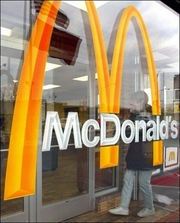 A US doctors' group sued seven leading fast-food chains
including McDonald's and Burger King over their use of a "dangerous
carcinogenic" in grilled chicken.
A US doctors' group sued seven leading fast-food chains
including McDonald's and Burger King over their use of a "dangerous
carcinogenic" in grilled chicken.
The Washington-based Physicians Committee for Responsible Medicine (PCRM)
filed suit in California "to compel the restaurants to warn unsuspecting
consumers" through in-store posters and menu messages.
The group said every sample of grilled chicken products from the seven
national chains "tested positive for a dangerous carcinogenic compound called
PhIP" during analysis at an independent laboratory.
PhIP is one of a group of carcinogenic compounds called heterocyclic amines
(HCAs) that are found in grilled meats. In 2005, the US government officially
added HCAs to its list of cancer-causing agents, the doctors' group said.
"Grilled chicken can cause cancer, and consumers deserve to know that this
supposedly healthy product is actually just as bad for them as high-fat fried
chicken," PCRM president Neal Barnard said in a statement.
"Even a grilled chicken salad increases the risk of breast cancer, prostate
cancer and other forms of this lethal disease," he said.
Aside from McDonald's and Burger King, the chains named in the lawsuit were
Chick-fil-A, Chili's, Applebee's, Outback Steakhouse and TGI Friday's.
The California Restaurant Association, which represents the major chains in
the richest US state, dismissed the doctors' lawsuit as groundless and
politically motivated.
"The PCRM are anti-meat advocates who want to limit consumer choice and limit
access to healthy dining options, which grilled chicken most definitely is,"
association spokeswoman Jordan Traverso told AFP.
"There's no evidence that the small amount of PhIP that comes out from cooked
grilled chicken poses a health risk to humans," she said, stressing that
undercooked chicken was far more dangerous.
But Mark Kennedy, staff attorney with the PCRM, said the restaurants had been
serially flouting a 1986 California law that requires them to give a "clear and
reasonable warning" about any carcinogens in their food.
He noted that the law, dubbed Proposition 65, carries a fine of 2,500 dollars
per violation per day.
But Kennedy added: "We're not seeking to punish these restaurants. We just
want them to obey the law.
"If at any time these restaurants were to come to us and say we'll post these
warnings, we'd be happy to drop the lawsuit."
McDonald's has found itself on the legal frontlines of late.
This year, it has been sued for failing to advertise the presence in its
French fries of dairy and gluten products, which can trigger a severe reaction
in some allergy sufferers.
Last year, a federal judge allowed an action to proceed against McDonald's
brought by plaintiffs who accuse the burger giant of making them obese.
In 2004, the House of Representatives passed the so-called "Cheeseburger
Bill" to ban "frivolous" lawsuits by obesity sufferers against the fast-food
industry. But the measure has not received a vote in the Senate.
In Thursday's stock market trade, shares in McDonald's fell 0.58 percent to
39.59 dollars. Burger King Holdings was unchanged at 15.90 dollars.